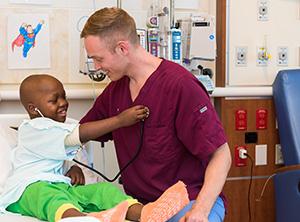Pediatric Hematology/Oncology Nursing
Pediatric Hematology/Oncology nursing is a career with multiple opportunities. Learn more about celebrating the profession as well as reasons to choose pediatric hematology/oncology nursing and possible paths to take.
Why Choose Pediatric Hematology/Oncology Nursing?

Pediatric Hematology/Oncology nursing is a career with multiple opportunities. It is a profession that demands broad knowledge (art and science of nursing), strong critical thinking/problem solving/decision making skills, and a high degree of compassion and sensitivity for children, adolescents, young adults, their families and their community.
In return you will experience an overwhelming sense of respect, appreciation for your service and the opportunity to make a difference in the lives of others.
Pediatric hematology/oncology nursing is a dynamic and evolving discipline that is based on knowledge derived from theory, research and practice. It is not only the knowledge that the pediatric nurse acquires but the application of this knowledge and the ability to artfully apply it to the care of a child, adolescent and/or young adult (AYA). From playfully getting a child to take their medicine to saving their life through critical thinking, the pediatric hematology/oncology nurse is making a difference in the lives of his/her patients.
Traits of a Pediatric Hematology/Oncology Nurse
Energy, creative, knowledgeable, competent, kind, hopeful, humorous, challenging, respectful, understanding, empathetic, teacher, researcher, inquirer, team player, collaborator, family-centered, … are descriptors of the pediatric hematology/oncology nurse….
Who Do Pediatric Hematology/Oncology Nurses Care For?
The pediatric hematology/oncology nurse cares for, manages patient care and assists patient/families with learning about the diagnosis and treatment. Conditions/Diagnosis range from congenital to acquired with often unknown etiology and can be life threatening and/or life changing/altering. She/he can work in the hospital setting (inpatient unit and outpatient clinic), physician’s office, home health care, radiation center, hospice/ palliative care service, and perform skills and services such as assessment of physical and psychosocial needs, administration of chemotherapy, biotherapy, immunosuppressants, teaching, supporting the patient going through their treatment by performing such interventions as administration medications to alleviate nausea/vomiting and pain, helping a child/AYA with loss of hair (body image), administering blood/blood products to alleviate anemia or thrombocytopenia, or supporting a patient through hospice/palliative care.
So How Do We Get There?
As you launch your career as a pediatric hematology/oncology nurse you must become a registered nurse (RN) by acquiring either an associate degree in nursing (ADN) or a bachelors degree in nursing (BSN). It is advisable to earn your BSN as it offers additional education in leadership and research which will help you in this career (it is heavily grounded in research and utilizes leadership skills).
- Earn your bachelors degree in nursing (BSN).
- While working on your nursing degree request to train on a pediatric hematology/oncology unit if available to obtain experience/exposure to this population of patients.
- If possible work as an extern or nursing assistant on a pediatric hematology/oncology unit while in nursing school or during the summer to gain experience/exposure
- Apply for an internship in pediatric hematology/oncology in the hospital when completing your degree in nursing.
- As a new nurse you may want to first work in a general pediatric unit to gain experience caring for pediatric patients and then work on a pediatric hematology/oncology unit.
- Before working in outpatient areas, gain experience in the inpatient setting to help you develop knowledge and critical thinking skills which can then help you in a more independent nursing role as the outpatient areas tend to require.
- Search the APHON (Association of Pediatric Hematology Oncology Nursing) career site for openings if unable to locate positions in local areas.
- Join APHON as your professional nursing organization as it offers:
- education for nurses (Foundations in pediatric hematology/oncology nursing and PBMT courses and Pediatric chemotherapy/biotherapy administration) and
- education materials for patients/families (such as written information about pediatric hematology/oncology diseases and medications),
- guidance in clinical practice (Evidence Based Practice),
- Journal of Pediatric Hematology/Oncology Nursing and Newsletter “APHON Counts”,
- annual national conference, and
- local chapter membership which allows for more education and networking and an opportunity for you to become involved.
- Get certification, CPHON (certification Pediatric hematology oncology nursing) through the Oncology Nursing Certification Corporation (ONCC) once you have worked as a pediatric hematology oncology nurse for at least 12 months.
- Another way in which you can work as a pediatric hematology oncology nurse is
as an APN (Advanced practice nurse). There are two types of APN’s:
Pediatric Nurse Practitioner (PNP) or Family Nurse Practitioner (FNP) and as Pediatric Clinical Nurse Specialist (Pedi CNS). These roles require further education by acquiring a masters degree in nursing. The PNP/FNP performs history/physical exams, assists with dx and treatment collaborating with the attending physician, may perform procedures such as bone marrow aspirations and lumbar punctures, and has prescriptive authority. The Pedi CNS may also be able to function as PNP (depends upon training) but has training as an educator, researcher, clinical practice expert and leader within a specialty and works with the health care institution/program.